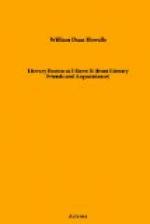I.
I do not think that such a fact would now move the fancy of the liveliest newspaper man, so much has the West since returned upon the East in a refluent wave of authorship. But then the West was almost an unknown quality in our literary problem; and in fact there was scarcely any literature outside of New England. Even this was of New England origin, for it was almost wholly the work of New England men and women in the “splendid exile” of New York. The Atlantic Monthly, which was distinctively literary, was distinctively a New England magazine, though from the first it had been characterized by what was more national, what was more universal, in the New England temperament. Its chief contributors for nearly twenty years were Longfellow, Lowell, Holmes, Whittier, Emerson, Doctor Hale, Colonel Higginson, Mrs. Stowe, Whipple, Rose Terry Cooke, Mrs. Julia Ward Howe, Mrs. Prescott Spofford, Mrs. Phelps Ward, and other New England writers who still lived in New England, and largely in the region of Boston. Occasionally there came a poem from Bryant, at New York, from Mr. Stedman, from Mr. Stoddard and Mrs. Stoddard, from Mr. Aldrich, and from Bayard Taylor. But all these, except the last, were not only of New England race, but of New England birth. I think there was no contributor from the South but Mr. M. D. Conway, and as yet the West scarcely counted, though four young poets from Ohio, who were not immediately or remotely of Puritan origin, had appeared in early numbers; Alice Cary, living with her sister in New York, had written now and then from the beginning. Mr. John Hay solely represented Illinois by a single paper, and he was of Rhode Island stock. It was after my settlement at Boston that Mark Twain, of Missouri, became a figure of world-wide fame at Hartford; and longer after, that Mr. Bret Harte made that progress Eastward from California which was telegraphed almost from hour to hour, as if it were the progress of a prince. Miss Constance F. Woolson had not yet begun to write. Mr. James Whitcomb Riley, Mr. Maurice Thompson, Miss Edith Thomas, Octave Thanet, Mr. Charles Warren Stoddard, Mr. H. B. Fuller, Mrs. Catherwood, Mr. Hamlin Garland, all whom I name at random among other Western writers, were then as unknown as Mr. Cable, Miss Murfree, Mrs. Rives Chanler, Miss Grace King, Mr. Joel Chandler Harris, Mr. Thomas Nelson Page, in the South, which they by no means fully represent.
The editors of the Atlantic had been eager from the beginning to discover any outlying literature; but, as I have said, there was in those days very little good writing done beyond the borders of New England. If the case is now different, and the best known among living American writers are no longer New-Englanders, still I do not think the South and West have yet trimmed the balance; and though perhaps the news writers now more commonly appear in those quarters, I should not be so very sure that they are not still characterized by New England ideals and examples. On the other hand, I am very sure that in my early day we were characterized by them, and wished to be so; we even felt that we failed in so far as we expressed something native quite in our own way. The literary theories we accepted were New England theories, the criticism we valued was New England criticism, or, more strictly speaking, Boston theories, Boston criticism.




